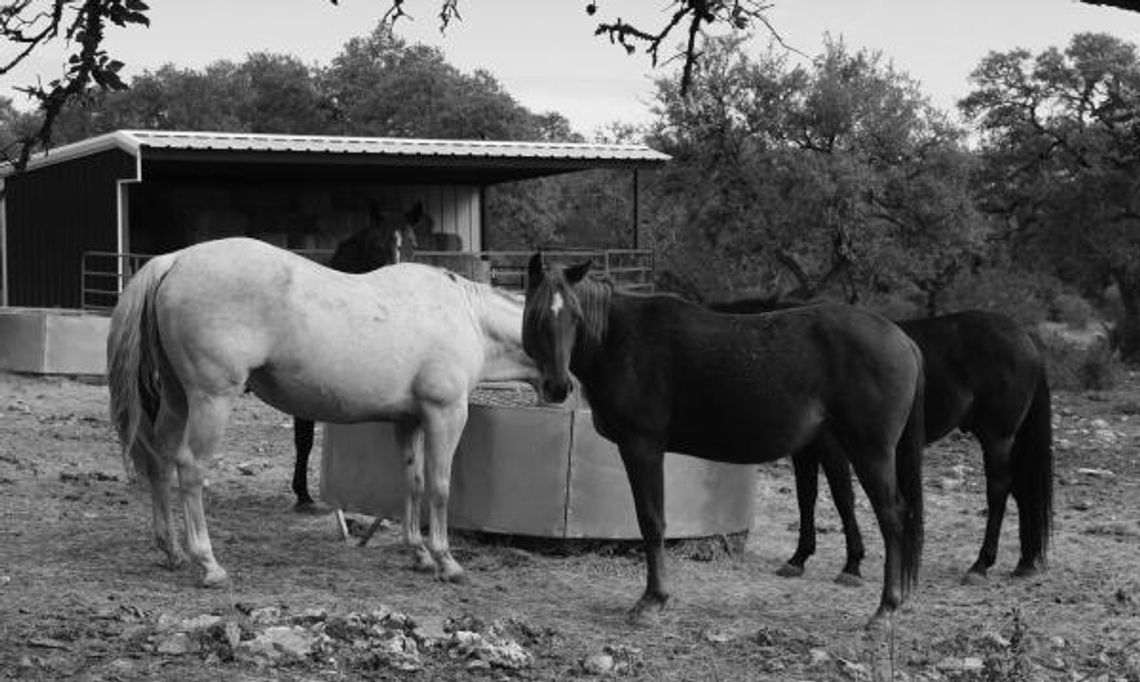Camille Carson recognized a problem and knew she had to do something. For that, she earned the everlasting gratitude of Taini, a sixyear- old Arabian mix that Carson picked up at a low-end horse auction.
Taini was destined for the slaughterhouse. She was malnourished, abused, had a respiratory infection and was, mostly, unapproachable.
“She was obviously starving and had been beaten,” recalled Carson, who purchased the horse for $275.
These days, Taini — which means “Returning Moon” in Chippewa — is healthy and happy on the 50-acre ranch that is home to the Driftwood Horse Rescue and Sanctuary. She walks up to meet visitors, welcomes human contact and is a month or so away from being ready for adoption.
“We helped her learn to be a horse again,” Carson said. “She still needs some training, but if someone wanted her, we could put her on a crash course.”
Taini and more than 20 other horses reside at the sanctuary that Carson and her husband, Midland’s lead guitarist and vocalist Jess Carson, founded about a year ago. A few of the horses on the ranch personally belong to the couple, but most of them are rescues.
Horse auctions
Carson routinely drops in on horse auctions around the country and buys horses destined for slaughter. The horses are then transported to Driftwood where they are doctored, fed and trained. Each horse has to be quarantined for month to make sure it doesn’t have a communicable disease.
Killing horses for food is illegal in the United States, Carson explained, but horse traders often buy the animals cheap in the United States and truck them to Canada or Mexico. From there, they are butchered and shipped to other countries for human consumption.
The process is pretty brutal, Carson said.
“It’s the opposite of humane,” she explained. “[The horses] are packed into semi trucks. A lot of them don’t make it. Many die on the way. You shouldn’t treat any animal like that.”
Instead of allowing horses to go through this process, the horses purchased for the sanctuary are nursed back to health and offered back up for sale at a higher price unlikely to destine them for slaughter. Most horses are ready for adoption after a year at the sanctuary.
Carson pointed out that a horse like Taini might cost $20,000 if purchased from a breeder. She herself plans to charge $5,000–$6,000, and even at that, she will lose money. By the time she buys a horse, has it transported to the sanctuary, nurses it back to health and trains it, Carson figures she has invested something north of $20,000. But for her, she said, it’s about the horses, not the money.
“I don’t charge breeder prices,” she said, “but I try to place a value on them. I try not to sell the horses too cheap. In our society, we put value on what we pay for.”
Keeping 20 or more horses is not cheap. At other rescues, the dogs wolf down kibble; cats nibble away at their food. Camille’s rescue animals, frankly, eat like horses.
According to a survey by the University of Maine Extension Program, it costs about $4,000 a year to keep a horse. That figure varies, depending on location. Hay alone can cost $3 a day per horse, the survey found. For the average horse in the U.S, it costs more than $1,200 a year for hay and grain; farrier services, $350; routine veterinary care, $500; and pasture maintenance, $200. Throw in additional expenses like bedding and building maintenance, and the cost quickly approaches $4,000 — and that doesn’t include a boarding facility.
Veterinary bills are yet another large expense. Most every horse that comes to Driftwood Horse Rescue needs some sort of specialized medical attention as well as shots. It runs about $150 just for a ranch call.
“A partnership with a local vet would be amazing,” added Timea Chemez, executive director for the sanctuary.
Carson’s ultimate goal is to send happy, healthy horses to welcoming homes and restock the sanctuary with other animals in need. Currently, she has four horses ready for adoption.
Prices going up
Like most everything these days, the price of hay is skyrocketing. A year ago, a bale of hay ran $9. Today, the price per bale is close to $15.
“You wouldn’t believe how expensive it is just to get them (the horses) here,” Carson said. “As the economy tightens there are fewer donations coming in.”
Driftwood Horse Rescue is currently in the process of becoming a 501(c)(3) nonprofit organization.
Carson has a list of people who want to help around the ranch — grooming the horses, cleaning stalls, doing whatever needs to be done — but she needs a volunteer coordinator: someone to schedule and organize the helpers.
“I feel horses have so much to teach us,” says Camille. “I learn something new here everyday.”
Carson’s ultimate goal is to send happy, healthy horses to welcoming homes and restock the sanctuary with other animals in need. Currently, she has four horses ready for adoption.
For information on the project, donating, volunteering or more, visit driftwoodhorserescue. com.
.png)










